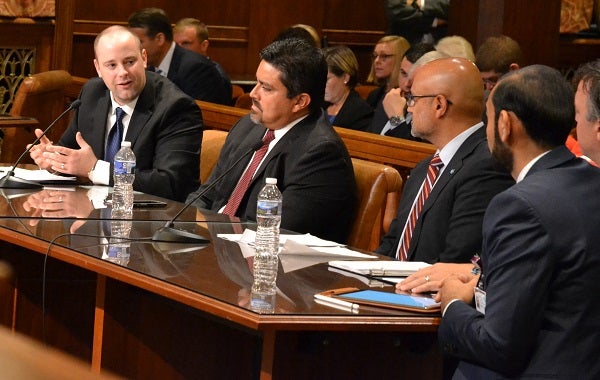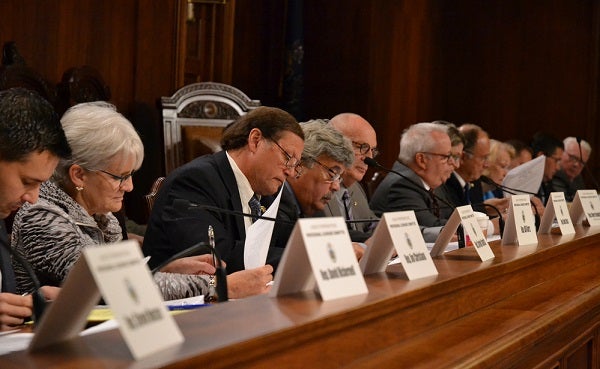Telemedicine bill draws support from providers, concern from insurers
The bill has already passed in the state senate and will go up for a vote in the house of representatives during the fall legislative session.

Guthrie Medical Group executive David Hall speaks before the House Professional Licensure Committee, advocating for proposed Senate Bill 780, which would regulate telemedicine and require insurers to cover it. (Brett Sholtis/Transforming Health)
A proposed bill that would require insurers to pay for telemedicine services is drawing widespread support from health care providers and opposition from some in the health insurance industry.
“Telemedicine” is a term for the use of smart phones, laptops and other devices, paired with health care apps, to connect patients with doctors.
The idea is that instead of trying to book an appointment with a primary care provider, or rush to the emergency room, people can talk with a physician by video chat, phone call or instant message.
The idea isn’t new, but if the proposed bill passes in the state House, it’s about to become a lot more common.
The proposal, Senate Bill 780, aims to “authorize health care providers to use telemedicine and require insurers to provide coverage and reimbursement for its use,” according to the bill summary.
The bill has already passed in the state senate and will go up for a vote in the house of representatives during the fall legislative session.
Some insurers are already covering certain tele-services, said Judd Hollander, a physician who also is a senior executive at Thomas Jefferson University. By establishing regulations and reimbursement, it will move telemedicine into the mainstream.
“One day, much like banking is just banking, no longer telebanking, telemedicine will just be medicine, because it’s just about taking care of the patient. It’s not actually about the technology,” Hollander said.
Hollander was one of several health care professionals to speak in support of the bill before the House Professional Licensure Committee at a public hearing Wednesday.
Hollander said he already runs a telemedicine program called JeffConnect, and he believes more access to telemedicine would reduce per-capita costs of health care, improve patient satisfaction and improve overall population health.

Telemedicine is especially useful in rural communities where there’s a shortage of doctors and therapists, said Sullivan County School District president Patricia Cross at the hearing.
Cross said her school district is one of the first in the region to use video chat to connect students with behavioral therapists from around the state.
That has provided needed mental health services for children while making more efficient use of therapists’ time, Cross said. That’s something other counties could benefit from as well.
“Having tele-psych would make it more beneficial for a therapist that otherwise may sit in an office and have no clients, which is what happens in Sullivan County.”
Telemedicine has wide-ranging benefits, but a “blanket mandate” to require insurers to cover tele-services is the wrong approach to increasing patient access, said Sam Marshall, President and CEO of Insurance Federation of Pennsylvania, which represents health insurance companies.
Marshall said he opposes the bill “in its current form,” saying it would put every telemedicine provider on an equal playing field – and that’s not a good thing, since quality of care can vary so much from one health care provider to another.
“The danger of any mandate is it treats all providers exactly the same,” Marshall said during an interview. “They’re not all exactly the same. Some have much better telemedicine programs than others.”
Marshall said poorly-designed telemedicine plans could drive up insurer costs for services that may not provide much value to patients.
“We think with respect to insurance, what would make a lot more sense right now is to get a dialogue going between insurers and providers.”
WHYY is your source for fact-based, in-depth journalism and information. As a nonprofit organization, we rely on financial support from readers like you. Please give today.





